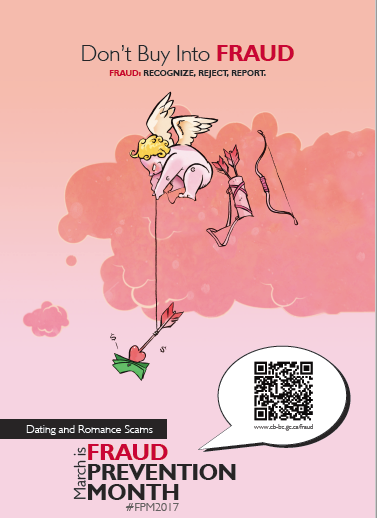March 6th, 2017
BURLINGTON, ON
It’s Fraud Prevention Month (#FPM2017) and the Halton Regional Police Service (HRPS) releases the first of four graphics illustrating common scams used on innocent, sometimes gullible people.
The program is being run nationally with the RCMP who report that 748 victims lost more than $17-million in 2016 to con artists purporting to be in love. The figures are believed to be much higher as many victims are too ashamed to report the fraud.
Dating and romance scams often begin when an individual creates a fake profile and posts it on popular online dating websites and/or social media. From there, he/she solicits interest in an attempt to gain a victim(s) affection and trust. Soon thereafter, a request(s) for funds is made. Believing themselves to be in a committed relationship, the victim often willingly complies. Money sent is not re-paid and the con artist disappears when they believe they have received all they can from someone.
“Dating and romance scams are popular because fraudsters prey upon the desire many people have to be love and accepted,” said Staff Sergeant Chris Lawson of the Regional Fraud Unit. “Sadly, it is often those who can least afford to lose money – older men and women, people who live alone or those with limited funds – who are victimized.”
The following dating and romance scam safety tips have been provided courtesy of the RCMP and the Competition Bureau of Canada:
• Only use legitimate and reputable dating sites.
• Check the addresses of online dating websites carefully. Scammers often set up fake websites with very similar URLs to legitimate ones.
• Be suspicious when someone you haven’t met in person professes their love. Ask yourself: Would someone I have never met really declare their affection after only a few letters or emails? Like many scams, if it sounds too good to be true, it likely is.
• Be skeptical of out-of-the-ordinary stories. Common narratives include someone claiming to live nearby but who is working overseas or someone with a sick family member in need of funds.
• In some cases, scammers will try to lure potential victims with flowers or other small gifts before asking for banking details or money.
• Never send money or give credit card or online account details to anyone you do not know and trust.
Anyone with information pertaining to a fraud or any other crime is asked to contact the Regional Fraud Bureau Intake Office at 905-465-8741 or Fraud@haltonpolice.ca. Tips can also be submitted anonymously to Crime Stoppers “See something, Hear something, Say something” at 1-800-222-8477 (TIPS), through the web at www.haltoncrimestoppers.ca, or by texting “Tip201” with your message to 274637 (crimes).





















